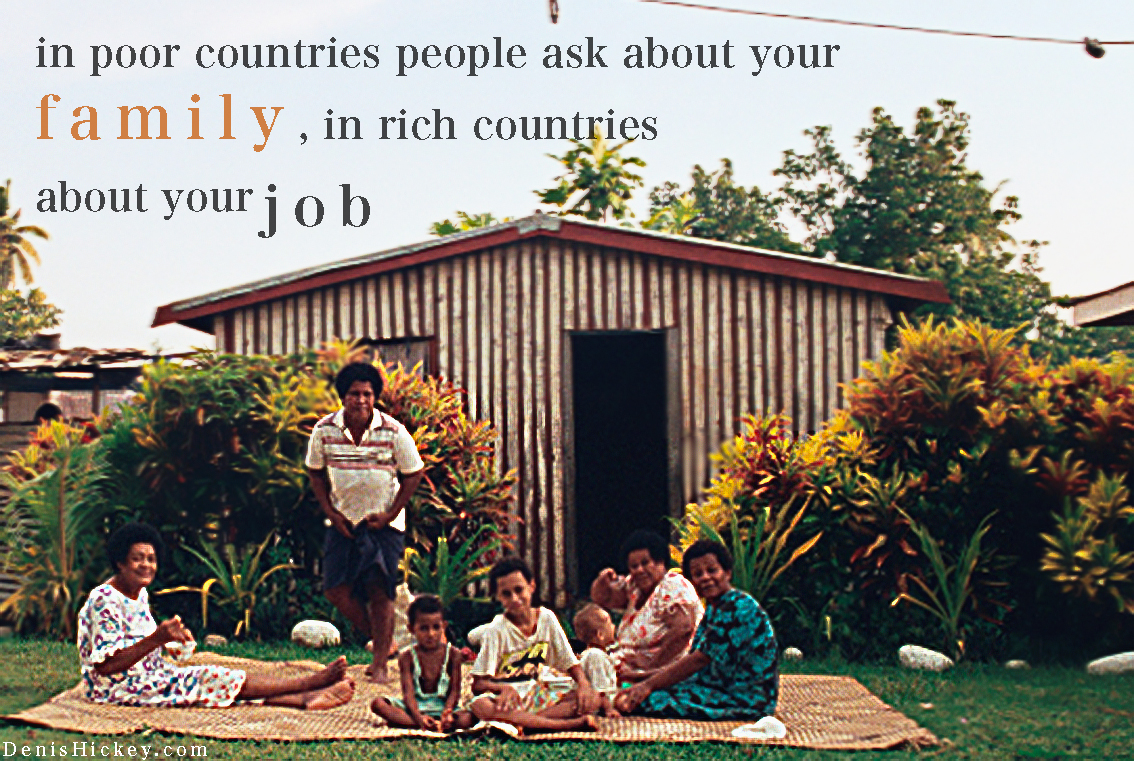In poor countries, people ask: Are you married? How many children do you have? What are their names? The emphasis: family. My youngest daughter who traveled for five years said to me, “In the rich world people ask what you do for a living. In poor countries they ask about your family. It’s clear the West is about individual, and poor countries about family.”
Societies that emphasize the individual can’t help but be richer, because unleashing minds to self determination that were previously subservient to family frees up 50% of the population (females) and males not favored by position.
The other side of the coin is that family life focuses time in a different way. In poor hot countries (which constitute much of the world) people move slower and have additional family members to take care of kids. Kids are the pension plan and value is assigned accordingly. When I was in Lake Naivasha, Kenya, I visited an island inhabited by animals. I was the single human. Flies buzzed in the soft warm breeze and time passed slowly. I observed an Eland buck protecting its herd, scars on his face attesting to this fact. This scene made me consider Old World patriarchy and the Kennedy model of great family that I aspired to as a young man, a desire originating from my grandmother’s stories and keen sense of heritage. After observing the Eland, I wrote these thoughts on a pad of paper.
Old Style/Third world Families:
- Sex private, primarily for producing lots of kids.
- Grandparents, cousins, aunts, and uncles tied together by economics and tradition (storytelling, singing together, celebrations, respect for age, marriage forever).
- Males protect family, resolve disputes, set family philosophy.
- Females raise children, organize family, nurture, execute family philosophy. If the man was the head, they were the neck turning the head.
- Needs of individuals subservient to those of family.
- Marriage forever.
- Inheritance by eldest male child.
Our Hickey family charter: Build a family of integrated individuals who utilize defined principles to positively influence others and live happily as individuals within a family unit.
I studied the difference in models: Old style families last longer. Sex for procreation vs. recreation. Large families (lots of brothers, sisters, cousins, ants, uncles, celebrations) vs. replacement concept (2 kids, stable population, equality between male and female, breakneck achievement), more time in family oriented societies because of lag in achievement.
What about family history. My grandmother kept it alive. Me too! Who will be the reservoir of family knowledge when I die? Although the concepts of family first and marriage forever was present in my youth, the focus on individual achievement does not lend itself as easily to these concepts. Individual, by definition, is selfish.
Success comes from where you focus your time. My old dreams of “great family” had been altered by the number of children I had and contemporary emphasis on the individual. My family supplied meaning. Then suddenly everyone was going their own way. Once the sense of oneness with family was gone, I was left trying to cope with the speed of society and wondering how much was enough to buy my way out of it.
Is the Kennedy model dead? Is world unrest the result of the enormous philosophical gap between poor countries with strong family values and rich countries that put the individual first? After all, fighting is always in poor countries.



Comments are closed.